 With "electoral chaos" said to be reigning in Wisconsin following last week's extraordinary ruling by three Republican appointees to the federal bench, the American Civil Liberties Union (ACLU) has filed an Emergency Petition for Rehearing En Banc [PDF] before the full U.S. 7th Circuit Court of Appeal.
With "electoral chaos" said to be reigning in Wisconsin following last week's extraordinary ruling by three Republican appointees to the federal bench, the American Civil Liberties Union (ACLU) has filed an Emergency Petition for Rehearing En Banc [PDF] before the full U.S. 7th Circuit Court of Appeal.
The ACLU is seeking the immediate reinstatement of the District Court's injunction of the state Republicans' Photo ID voting law. The lower court had previously found the statute to be, in no uncertain terms, in violation of both the U.S. Constitution and the federal Voting Rights Act.
When they later file briefs, the ACLU and other attorneys representing the plaintiffs in Frank v. Walker will undoubtedly go into greater depth to explain how the three GOP members of the 7th Circuit panel erroneously interpreted the U.S. Supreme Court's 2008 decision in Crawford vs. Marion County Elections Board and how the WI law, "Act 23", is "materially different from" the Photo ID law passed by Indiana Republicans and approved by SCOTUS in 2008.
The emergency filing, however, zeroes in on what the ACLU describes as chaos and disenfranchisement that will likely be caused by an "extraordinary decision" last week, which, they say, seeks to effectuate a "slapdash implementation" of a radical and complex change in the Badger State's election law just seven weeks prior to the November 2014 general election...
'6,000 Photo IDs Per Day'?!
By its express terms, Wisconsin's Act 23 contemplated it would take between eight to sixteen months to roll out. The ACLU observed:
Pointing to the District Court's factual findings, the ACLU added that the "DMV has only 92 offices statewide...and in 48 counties representing over a quarter of the state's population, those offices are open only two days a week for a total of ten hours. DMV is simply incapable of processing a substantial number of applications from the 300,000 registered voters without ID."
Walker's Gamesmanship?
The new filing suggests that, with Republican Governor Scott Walker's re-election hanging in the balance, the state may have purposely dragged its feet in implementing changes that were imposed by the Wisconsin Supreme Court, when, on July 31, 2014, it lifted then-pending state court injunctions. (Before the recent decisions at the state Supreme Court and by the three-judge federal appellate panel, the law had been repeatedly struck down at both the state and federal levels.)
Even the highly partisan Wisconsin Supreme Court recognized "the 'severe burdens' imposed by Act 23," according to the ACLU. In an effort to salvage the fatally flawed statute, that Court directed that the WI DMV to "make free IDs available to those who otherwise had to pay for documents like birth certificates to get ID."
The state, according to the ACLU's emergency filing, delayed any official action on that WI Supreme Court directive until September 12, when, during oral arguments before the 7th Circuit panel, Walker's legal counsel revealed, for the first time, that the "DMV had issued new emergency rules that purport to address the identified deficiencies."
Those new rules became effective this week, Monday, September 15, for the very first time, just seven (7) weeks before Election Day.
The DMV estimates that, under the new rules, it will take eight (8) weeks to verify identification of voters who were born in other states. "Almost 47% of eligible Milwaukee voters without ID were born outside Wisconsin. This population is disproportionately comprised of Blacks and Latinos, who are more likely than whites to lack both ID and a document needed to get ID, such as birth certificates," according to the ACLU petition.
The ACLU also charges that the all-Republican, three-judge 7th Circuit panel based its decision to immediately stay the lower court's injunction upon the new ID rules that Walker's attorneys filed with the court after oral argument. The new DMV processes for granting IDs were not provided to the plaintiffs earlier, in what amounts to a denial of due process. The plaintiffs, therefore, had no opportunity to respond, and point out the irreparable harm to voters who presently lack the requisite ID.
Breaking Precedent
"Supreme Court precedent and other Circuits," the ACLU forcefully argues, "uniformly caution against such eleventh-hour changes to the election laws, even where those courts have approved those changes for future elections." Indeed, the Supreme Court has admonished our federal intermediate appellate courts "against last-minute reversals of lower court election law rulings." An order to stay an injunction in such cases also requires a clear showing of irreparable harm to the party seeking the stay.
Permitting the election procedures under which Wisconsin has been operating "to remain in place for one more election" will not "result in irreparable harm to the state," the Emergency Petition argues.
The fact that Walker may not receive the majority of votes lawfully cast in a fair and free election, it would seem, is a far cry from what our courts can consider to be "irreparable harm."


 A Pretty Weak 'Strongman': 'BradCast' 10/30/25
A Pretty Weak 'Strongman': 'BradCast' 10/30/25 'Green News Report' 10/30/25
'Green News Report' 10/30/25
 Proposal for 'First Politically Viable Wealth Tax' Takes Shape in CA: 'BradCast' 10/29/25
Proposal for 'First Politically Viable Wealth Tax' Takes Shape in CA: 'BradCast' 10/29/25 Monster Storm, Endless Wars, Gamed Elections:
Monster Storm, Endless Wars, Gamed Elections: 'Green News Report' 10/28/25
'Green News Report' 10/28/25 Let's Play 'Who Wants
Let's Play 'Who Wants Sunday 'Cartoonists Dilemma' Toons
Sunday 'Cartoonists Dilemma' Toons Exiled NOAA Scientists Resurrect Critical Disaster Database: 'BradCast' 10/23/25
Exiled NOAA Scientists Resurrect Critical Disaster Database: 'BradCast' 10/23/25  'Green News Report' 10/23/25
'Green News Report' 10/23/25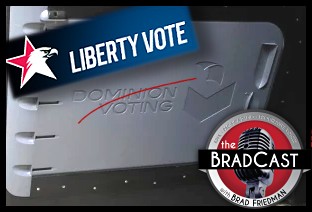 Trump-Allied GOP Partisan Buys Dominion Voting Systems: 'BradCast' 10/22/25
Trump-Allied GOP Partisan Buys Dominion Voting Systems: 'BradCast' 10/22/25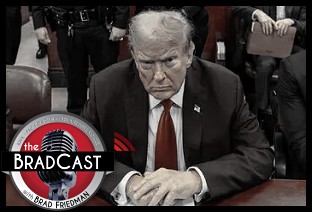 Trump, Republican Law(lessness) & (Dis)Order: 'BradCast' 10/21/25
Trump, Republican Law(lessness) & (Dis)Order: 'BradCast' 10/21/25 'Green News Report' 10/21/25
'Green News Report' 10/21/25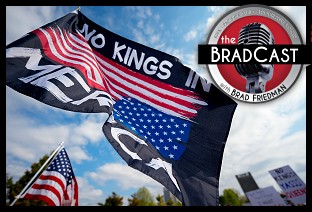 Celebrating 'No Kings': 'BradCast' 10/20/25
Celebrating 'No Kings': 'BradCast' 10/20/25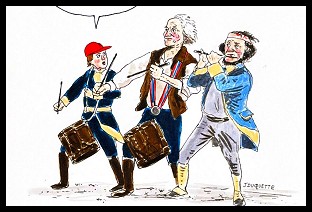 Sunday 'How It Started' Toons
Sunday 'How It Started' Toons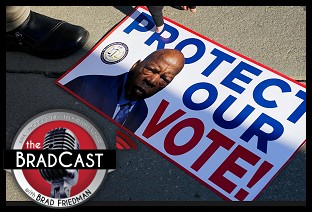 SCOTUS Repubs Appear Ready to Gut Rest of Voting Rights Act: 'BradCast' 10/16/25
SCOTUS Repubs Appear Ready to Gut Rest of Voting Rights Act: 'BradCast' 10/16/25 'Green News Report' 10/16/25
'Green News Report' 10/16/25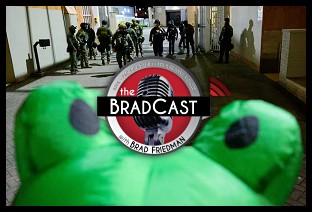 The 'Epstein Shutdown' and Other Autocratic Nightmares: 'BradCast' 10/15/25
The 'Epstein Shutdown' and Other Autocratic Nightmares: 'BradCast' 10/15/25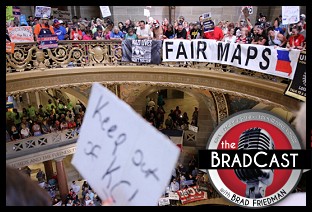 Group Vows to Block MO's GOP U.S. House Gerrymander: 'BradCast' 10/14/25
Group Vows to Block MO's GOP U.S. House Gerrymander: 'BradCast' 10/14/25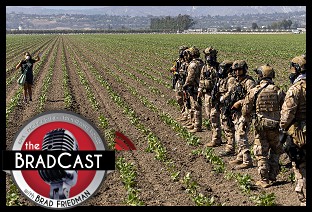 Trump Labor Dept. Warns Trump Policies Sparking Food Crisis: 'BradCast' 10/9/25
Trump Labor Dept. Warns Trump Policies Sparking Food Crisis: 'BradCast' 10/9/25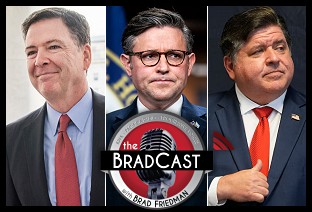 Trump's Losing Battles: 'BradCast' 10/8/25
Trump's Losing Battles: 'BradCast' 10/8/25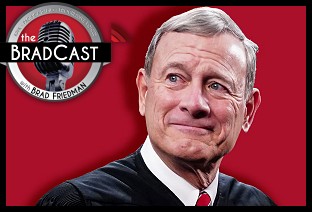 Trump, Roberts and His Stacked, Packed and Captured SCOTUS: 'BradCast' 10/7/25
Trump, Roberts and His Stacked, Packed and Captured SCOTUS: 'BradCast' 10/7/25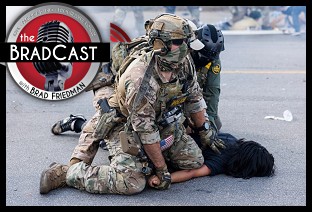 Trump Attempting His 'Invasion from Within': 'BradCast' 10/6/25
Trump Attempting His 'Invasion from Within': 'BradCast' 10/6/25 Biden Budget Expert: Mass Firings in Shutdown 'Illegal': 'BradCast' 10/2/25
Biden Budget Expert: Mass Firings in Shutdown 'Illegal': 'BradCast' 10/2/25 Why is DOJ Suing 'Blue' States for Their Voter Databases?: 'BradCast' 10/1/25
Why is DOJ Suing 'Blue' States for Their Voter Databases?: 'BradCast' 10/1/25
 VA GOP VOTER REG FRAUDSTER OFF HOOK
VA GOP VOTER REG FRAUDSTER OFF HOOK Criminal GOP Voter Registration Fraud Probe Expanding in VA
Criminal GOP Voter Registration Fraud Probe Expanding in VA DOJ PROBE SOUGHT AFTER VA ARREST
DOJ PROBE SOUGHT AFTER VA ARREST Arrest in VA: GOP Voter Reg Scandal Widens
Arrest in VA: GOP Voter Reg Scandal Widens ALL TOGETHER: ROVE, SPROUL, KOCHS, RNC
ALL TOGETHER: ROVE, SPROUL, KOCHS, RNC LATimes: RNC's 'Fired' Sproul Working for Repubs in 'as Many as 30 States'
LATimes: RNC's 'Fired' Sproul Working for Repubs in 'as Many as 30 States' 'Fired' Sproul Group 'Cloned', Still Working for Republicans in At Least 10 States
'Fired' Sproul Group 'Cloned', Still Working for Republicans in At Least 10 States FINALLY: FOX ON GOP REG FRAUD SCANDAL
FINALLY: FOX ON GOP REG FRAUD SCANDAL COLORADO FOLLOWS FLORIDA WITH GOP CRIMINAL INVESTIGATION
COLORADO FOLLOWS FLORIDA WITH GOP CRIMINAL INVESTIGATION CRIMINAL PROBE LAUNCHED INTO GOP VOTER REGISTRATION FRAUD SCANDAL IN FL
CRIMINAL PROBE LAUNCHED INTO GOP VOTER REGISTRATION FRAUD SCANDAL IN FL Brad Breaks PA Photo ID & GOP Registration Fraud Scandal News on Hartmann TV
Brad Breaks PA Photo ID & GOP Registration Fraud Scandal News on Hartmann TV  CAUGHT ON TAPE: COORDINATED NATIONWIDE GOP VOTER REG SCAM
CAUGHT ON TAPE: COORDINATED NATIONWIDE GOP VOTER REG SCAM CRIMINAL ELECTION FRAUD COMPLAINT FILED AGAINST GOP 'FRAUD' FIRM
CRIMINAL ELECTION FRAUD COMPLAINT FILED AGAINST GOP 'FRAUD' FIRM RICK SCOTT GETS ROLLED IN GOP REGISTRATION FRAUD SCANDAL
RICK SCOTT GETS ROLLED IN GOP REGISTRATION FRAUD SCANDAL VIDEO: Brad Breaks GOP Reg Fraud Scandal on Hartmann TV
VIDEO: Brad Breaks GOP Reg Fraud Scandal on Hartmann TV RNC FIRES NATIONAL VOTER REGISTRATION FIRM FOR FRAUD
RNC FIRES NATIONAL VOTER REGISTRATION FIRM FOR FRAUD EXCLUSIVE: Intvw w/ FL Official Who First Discovered GOP Reg Fraud
EXCLUSIVE: Intvw w/ FL Official Who First Discovered GOP Reg Fraud GOP REGISTRATION FRAUD FOUND IN FL
GOP REGISTRATION FRAUD FOUND IN FL

































